
The Afsluitdijk is a major dam and causeway in the Netherlands. It was constructed between 1927 and 1932 and runs from Den Oever in North Holland province to the village of Zurich in Friesland province, over a length of 32 kilometres (20 mi) and a width of 90 metres (300 ft), at an initial height above Amsterdam Ordnance Datum of between 6.7 metres (22 ft) along the section at Friesland, and 7.4 metres (24 ft) where it crosses the deep channel of the Vlieter. The height at the greater sea depths west of Friesland was required to be a minimum of 7 metres everywhere when originally constructed.

De Adriaan is a windmill in the Netherlands that burnt down in 1932 and was rebuilt in 2002. The original windmill dates from 1779 and the mill has been a distinctive part of the skyline of Haarlem for centuries.
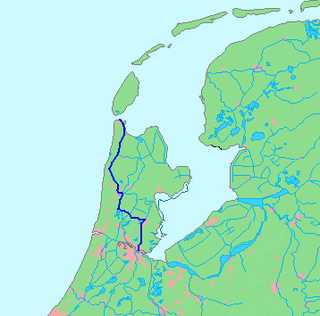
The Noordhollandsch Kanaal is a canal originally meant for ocean-going ships. It is located in North Holland, Netherlands. The canal was of great significance in Dutch history.

Rijkswaterstaat, founded in 1798 as the Bureau voor den Waterstaat and formerly translated to Directorate General for Public Works and Water Management, is a Directorate-General of the Ministry of Infrastructure and Water Management of the Netherlands. Its role is the practical execution of the public works and water management, including the construction and maintenance of waterways and roads, and flood protection and prevention. The agency was also involved in the construction of big railway projects such as the Betuweroute and the HSL-Zuid.
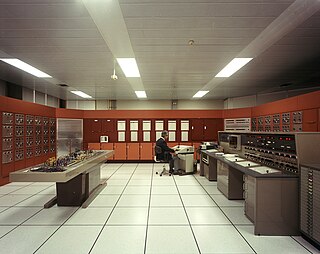
The Deltar was an analogue computer used in the design and execution of the Delta Works from 1960 to 1984. Originated by Johan van Veen, who also built the initial prototypes between 1944 and 1946, its development was continued by J.C. Schönfeld and C.M. Verhagen after van Veen's death in 1959.

Johannes Aleidis (Johan) Ringers was a Dutch hydraulic engineer and politician. He served as the director-general of Rijkswaterstaat and later as the director of Dutch East Indies Railways. During World War II, Ringers was appointed as the government commissioner for reconstruction, but was later interned by German forces.

Christiaan Brunings was a Dutch hydraulic engineer.
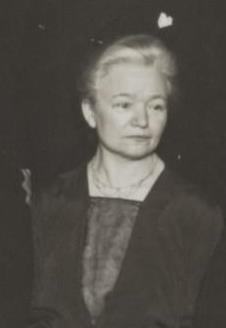
Jantina "Tine" Tammes was a Dutch botanist and geneticist and the first professor of genetics in the Netherlands.

Jansje Gretha (Jans) Schuiringa, also known as Miss Schuiringa, was one of the first people in the Netherlands to hold the title of dentist. The work that Schuiringa carried out between 1920 and 1957 as a professor of prosthetic dentistry at the Institute of Dentistry in Utrecht, was of major significance in the development of the discipline of maxillofacial dental surgery. Maxillofacial dental surgery, which operates on the jaw and the face, involves making prosthetics for the face and teeth.
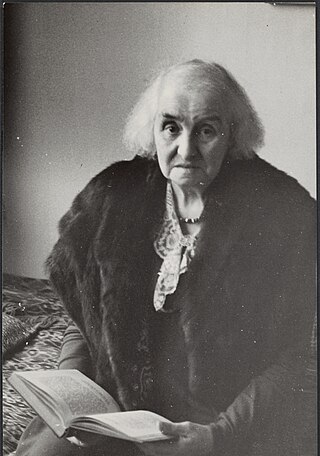
Anna Maria van Gogh-Kaulbach was a Dutch writer and translator. She published a number of works under the pen names Wilhelmina Reynbach, Erna, Mac Peter and Wata.

Bertha "Betsy" Bakker-Nort was a Dutch lawyer and politician who served as a member of the House of Representatives for the Free-thinking Democratic League (VDB) from 1922 to 1942.
Stella Simons was a Dutch lawyer and feminist. Simons undertook many activities in the field of child protection, care for the poor and feminism. She received recognition through her honorary membership from the UVSV and from the VVAO. Moreover, in 1958 she was appointed Officer in the Order of Orange-Nassau.
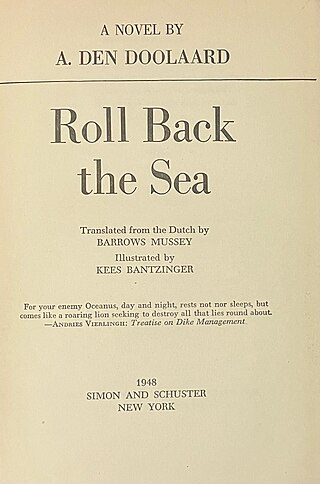
Het verjaagde water is a 1947 Dutch non-fiction novel written by A. den Doolaard, which gives an account of the recovery works to repair dike breaches after the October 1944 Inundation of Walcheren as part of operations by The Allies of World War II during Operation Infatuate. Researchers from Delft University of Technology have found high levels of historical accuracy in den Doolaard's descriptions of the events that took place, the methods used to close the dikes and the key people involved. Den Doolaard assigned pseudonyms to most of the main characters and organisations. The name A. den Doolaard is also a pseudonym, the author’s real name being Cornelis Johannes George Spoelstra Jr.
Jo Johannis Dronkers was a Dutch mathematician who is notable for the development of mathematical methods for the calculation of tides and tidal currents in estuaries. His work formed much of the mathematical basis for the design of the Delta Works. He attended the 1954 International Congress of Mathematicians in Amsterdam, where his work was discussed by David van Dantzig.

Johannes Theodoor Thijsse was a Dutch hydraulic engineer who made significant contributions to hydraulic engineering both in The Netherlands and internationally. In addition to having a major involvement in the design and planning of both the Zuiderzee Works and the Delta Works, he published widely and played a key role in the establishment of the IHE Delft Institute for Water Education.

Pieter Philippus Jansen was a Dutch civil engineer and hydraulic engineer who made significant contributions to hydraulic engineering in The Netherlands. He spent the majority of his career with Rijkswaterstaat, working on several major projects including the first phase of the Delta Works and leading the reclamation and repair efforts following the inundation of Walcheren.
RKSV HBC, often also abbreviated as SV HBC or just HBC, is a Dutch football club from Heemstede. The club was founded in 1902 and plays its home matches at the HBC Sportpark.

Hendrik Wortman was a Dutch civil engineer. Born in Amersfoort, Utrecht, he graduated from Delft Polytechnic in 1880 and joined the Rijkswaterstaat. He took offices throughout the country, focusing particularly on questions of water management and hydraulic engineering, until he was seconded to the Ministry of Public Works, Trade, and Industry in 1894. In this capacity, he developed several infrastructure projects, including a harbour in Scheveningen, while preparing exploratory studies for damming of the Zuiderzee.

The Maatschappij tot Uitvoering van Zuiderzeewerken (MUZ) (English: Society for the Execution of the Zuiderzee Works) was a consortium of dredging contractors in the Netherlands, formed in August 1926 for the specific purpose of executing the Zuiderzee Works. The Zuiderzee Works comprised a number of significant hydraulic engineering projects designed to dam the Zuiderzee, a large shallow inlet of the North Sea, to prevent flooding and reclaim land for agricultural and residential use.
Nellien de Ruiter was a Dutch politician. She represented the Christian Historical Union (CHU) in the House of Representatives in 1972.

















